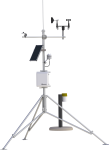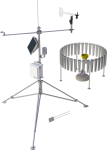O que nós fazemos
From single research weather stations to mesoscale weather networks (mesonets), Campbell Scientific automatic weather stations have become the worldwide standard for climate and boundary-layer meteorology. They are integral parts of forecasting and monitoring systems worldwide. Accurate measurements, low power requirements, and proven reliability in extreme weather conditions make our weather stations ideal for all types of meteorological and climatological monitoring anywhere on earth.
Aprender maisVeja alguns exemplos impressionantes que nosso equipamento pode fazer nesta área
For an introduction to our solutions that are compliant with World Meteorological Organization (WMO) and Global Basic Observing Networks (GBON) standards for the Systematic Observations Financing Facility (SOFF) initiative, visit our GBON-Compliant Observation Solutions page.
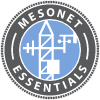
For an introduction to mesonets, their value, and how they work, visit the Mesonet Essentials section.
Customize a System
In addition to our standard systems available, many of the systems we provide are customized. Tell us what you need, and we’ll help you configure a system that meets your exact needs.
Componentes do Sistema
We offer a variety of products that can be used to create systems for Automatic Weather Stations (AWS) and Meteorologic Instruments. Many of the major components used to create these systems are listed below. Please let us know if we can help you configure a system.
Mais Detalhes sobre os Nossos Automatic Weather Stations (AWS) and Meteorologic Instruments Sistemas
Data loggers for weather monitoring
Our weather stations are based around a programmable data logger (typically a CR1000 or CR3000) that measures the sensors, then processes, stores, and transmits the data. Our data loggers have wide operating temperature ranges, on-board instructions, programmable execution intervals, and ample input channels for commonly used sensors. Wind vector, wet bulb, histogram, and sample on maxima or minima are standard in the data logger instruction sets. Most sensors can be measured directly—without external signal conditioning.
Data are typically viewed and stored in the units of your choice (e.g., wind speed in mph, m/s, knots). Measurement rates and data recording intervals are independently programmable, allowing calculation of 15-minute, hourly, and daily data values from 1-minute or 1-second measurements, for example. Conditional outputs, such as rainfall intensity and wind gusts, can also be recorded. The program can be modified at any time to accommodate different sensor configurations or new data processing requirements. If needed, channel capacity can be expanded using multiplexers, including a model designed specifically for thermocouples.
Weather Sensors
Almost any meteorological sensor can be measured by our data loggers, allowing stations to be customized for each site. Typical sensors used on our stations include, but are not limited to:
- Wind speed and direction
- Solar radiation
- Temperature (air, water, soil)
- Relative humidity
- Precipitation
- Snow depth
- Barometric pressure
- Soil moisture
In some locations, hydrological sensors provide additional measurements, such as water level of a nearby stream.
Data Retrieval
We offer multiple communications options for data retrieval, which can be mixed within the same network. Telecommunications options include short-haul, telephone (landline, voice-synthesized, cellular), radio frequency, multidrop, and satellite. On-site options include storage module and laptop computer.
Software
Our PC-based support software simplifies the entire weather monitoring process, from programming to data retrieval to data display and analysis. Our software automatically manages data retrieval from networks or single stations. Robust error-checking ensures data integrity. We can even help you post your data to the Internet.
Example Weather Stations
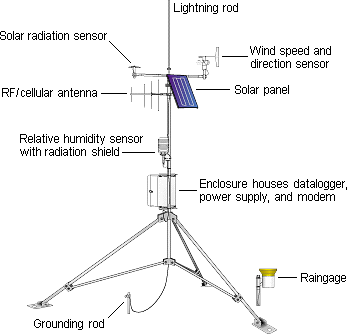
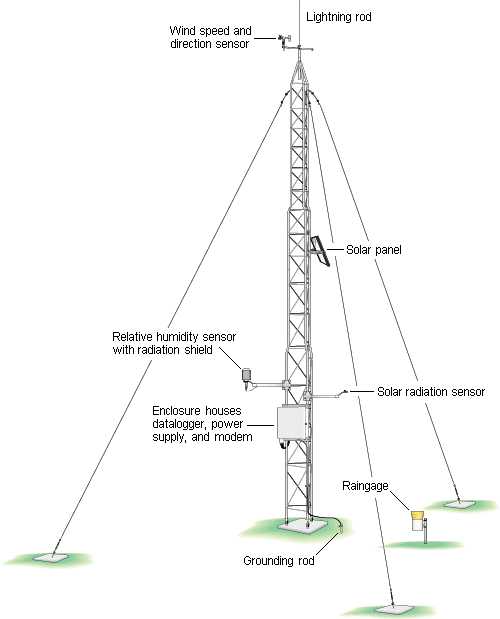
Estudos de Caso
Overview Iraq’s Ministry of Agriculture has deployed a nationwide network of solar-powered, satellite-linked agrometeorological stations. The......Leia mais
Overview The Department of Soil, Crop, and Climate Sciences at the University of the Free State......Leia mais
Overview In the heart of the UAE’s Empty Quarter desert—one of the harshest and least hospitable......Leia mais
Overview In a landmark milestone for global meteorological cooperation, Rwanda has become the first country to......Leia mais
In 2019, Campbell Scientific embarked on a significant project with the Malawi Department of Climate......Leia mais
Tropical volcanic islands are biodiversity hotspots where the Critical Zone (CZ) remains poorly studied. In......Leia mais
Overview In May 2019, the Government of Zambia embarked on the Climate Adaptation Water and Energy......Leia mais
Overview The Chauvet-Pont d'Arc and Aven d'Orgnac caves are home to prehistoric treasures of rare artistic......Leia mais
Documentos Relacionados
Lâminas do produto
Integradores Relacionados
- Weston Solutions, Inc.
- GroundWork Renewables, Inc.
- Western Weather Group, Inc.
- Environmental Engineering & Measurement Services
- Geo-Watersheds Scientific
- Providence
- Geonor, Inc.
- Technical Monitoring Services Incorporated (TMSI)
- Hydrogage, Inc.
- Adams Environmental Systems, Inc.
- OneRain
- Dynamax, Inc.
- ABS Alaskan, Inc.
- Intermountain Environmental
- RESPEC Consulting and Services
- Vista ehf
- Trinity Consultants-Utah
Artigos e Comunicados de Imprensa
Newsletter
- New MetSens Compact Sensors 26-07-2018
- Introducing the New PRO-Series Weather Stations 15-11-2017
- CS320: Digital, Heated Thermopile Pyranometer for Environmental Research 17-07-2017
- EE181 Temperature and Relative Humidity Probe Available Soon 28-10-2016
- Case Study: High-Elevation Weather in Peru 21-07-2016
- Case Study: University of Toronto Green Roof Research 21-07-2015
- Case Study: U.S. Climate Reference Network 09-05-2013













